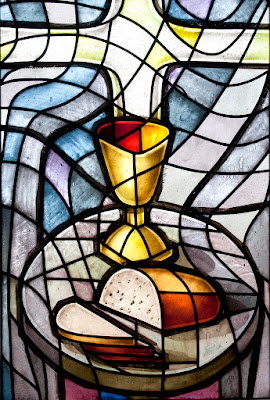THE MOST HOLY BODY AND BLOOD OF CHRIST -
Mark 14:12-16, 22-26
The Church calls upon us to direct our minds and our hearts to the Eucharist in which Jesus Christ offers himself to us as the bread of life.
In the Acts of the Apostles (Act 2:42), we read that “the breaking of bread” was one of the marks of the early Church, being the earliest known name of the Eucharistic celebration. The name brings to mind what Jesus did when he sat with the Apostles at the table. On the first day of the week, they gathered together to break the bread in memory of Jesus, doing what he had commanded them to do. It was a fellowship meal in which they shared the bread in obedience to Jesus with the certainty of faith that they were sharing the body and blood of Christ. This communion with Jesus implied communion with one another. Paul says as much in his first letter to the Corinthians: “The cup of blessing that we bless, is it not a participation in the blood of Christ?The bread that we break, is it not a participation in the body of Christ? Because there is one bread, we who are many are one body, for we all partake of the one bread.” (1 Co 10:16-17).
At the breaking of the bread, the first Christians celebrated the Lord’s Supper, being sure of the privilege of sitting at the table of the Lord. Indeed, “Blessed are those who are invited to the marriage supper of the Lamb.” (Rev 19:9). In the Lord’s Supper, we repeat Jesus’ words and gestures in the Last Supper.
A common name for the Lord’s Supper, mostly used nowadays, is the Eucharist, a Greek word meaning “thanksgiving”. The word reminds us of Jesus’s prayer over the bread and the cup of wine: He gave thanks (Lk 22:19). We must give thanks to God for all his blessings. This is an essential attitude towards God. It is not surprising that Paul advises us to “give thanks in all circumstances” (1 Ts 5:18). Jesus offered his life as a peace or fellowship offering (Lev 3).
The Eucharistic celebration is called also Holy Sacrifice since is the memorial of Jesus’ sacrifice on the cross. It is the sacrifice of the New Covenant and a sacrifice for the remission of sins. In the Last Supper, Jesus interprets his death as a sacrifice. The blood he sheds on the cross is the blood of the covenant, poured out for many.
In the second reading, the letter to the Hebrews presents Jesus as the High Priest, “who offered himself as the perfect sacrifice to God”, thus bringing a new covenant. By his death, he cancelled our sins (Hb 9:11-15).
The solemnity of the Most Holy Body and Blood of Christ is a solemn profession of faith in the real presence of Jesus Christ. When we approach the table of the Lord, we go prepared to receive the body and blood of the Lord. By the power of the Holy Spirit, that bread and cup of wine became for us the body and blood of Christ. When we go for communion, we must do it professing our faith. If we do not believe what the Church always believed, we must be careful. Paul warns us on that respect:
“Whoever, therefore, eats the bread or drinks the cup of the Lord in an unworthy manner will be guilty concerning the body and blood of the Lord. Let a person examine himself, then, and so eat of the bread and drink of the cup. For anyone who eats and drinks without discerning the body eats and drinks judgment on himself.” (1 Co 11:27-29).

No comments:
Post a Comment